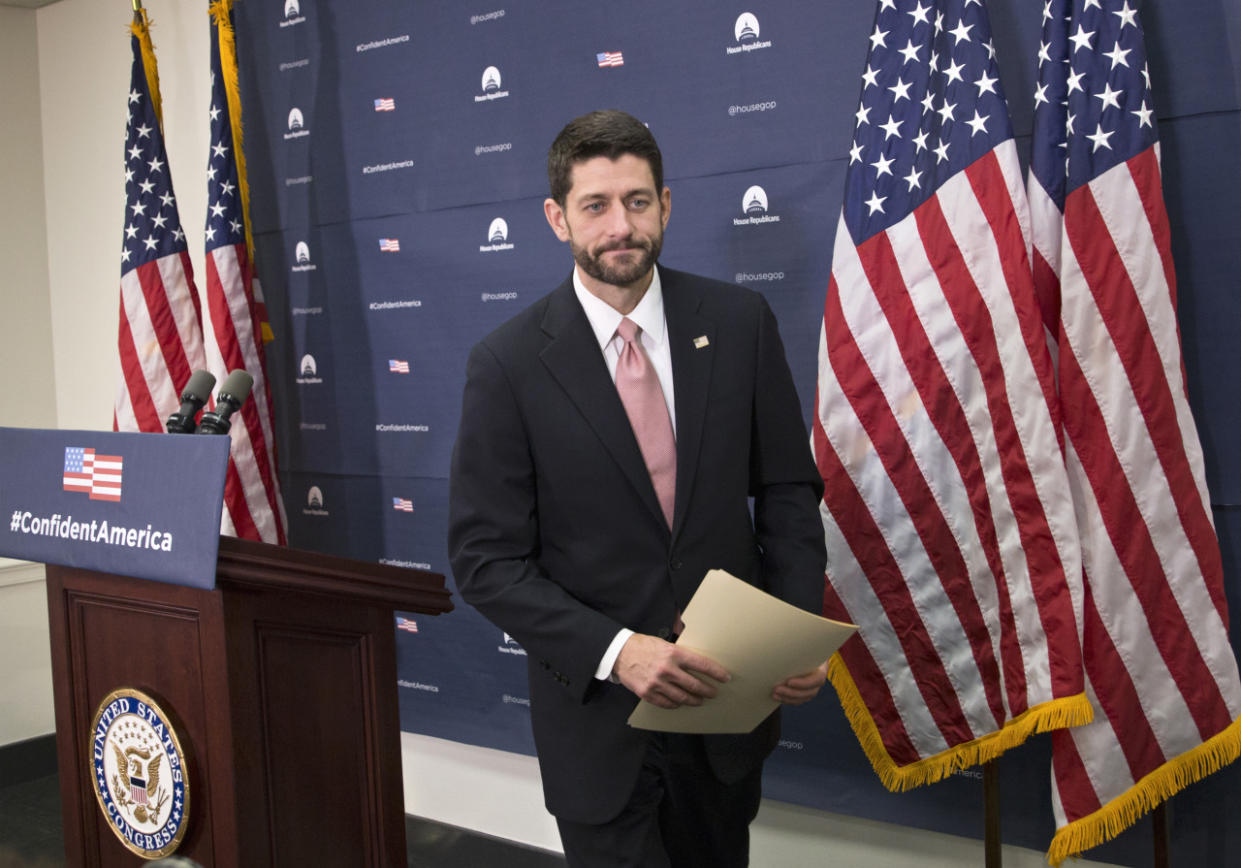Paul Ryan walks the tightrope, crafting $2 trillion fiscal package as shutdown looms

Speaker Paul Ryan, R-Wis., briefed reporters at the Capitol on the bipartisan spending agreement he helped craft with congressional leaders and appropriators. (AP Photo/J. Scott Applewhite)
The first real test of Paul Ryan’s speakership will come at the end of this week, as he and his leadership team must whip up enough votes to approve a $2 trillion year-end spending and tax-break package.
For Ryan, finding support for legislation that keeps the government operational, once a basic and assumed function of Congress, is a dangerous tightrope walk. He must build a coalition that includes enough Democrats to pass the package while not unduly agitating the far-right conservatives who never would support such agreements but have previously intimidated other Republicans into siding with them versus leadership. That’s the same walk that Ryan’s predecessor, former Speaker John Boehner of Ohio, couldn’t pull off himself, although by setting spending levels for the next two fiscal years in the last few days of his speakership, he built a safety net under Ryan for his first steps on the fiscal high wire.
The massive package, filed in the wee hours of Wednesday morning, is divided into two major pieces — a $1.15 trillion omnibus spending bill that funds the government through September 2016 and a tax bill that includes $650 billion worth of breaks, $590 billion of them permanent. The House is scheduled to vote on the tax deal Thursday and the omnibus Friday, but House Democratic leader Nancy Pelosi of California has expressed serious reservations about the tax deal. In practice, this means that Senate Democratic aides expect significant House Democratic defection on the first piece of the deal. This means that Senate Democrats are relying on Ryan in his first big moment as speaker to overcome potentially large Democratic opposition by delivering enough GOP votes for the tax provisions to be able to pass so that the entire deal can move in the Senate. That is no small order.
“I don’t think this is the way government should work. This is not how appropriations should work. … We played the cards that we were dealt,” Ryan told reporters Wednesday morning. He declined to say whether the package would get a majority of GOP votes but conceded there likely would be defections. “In divided government, you don’t get everything you want. This is a bipartisan compromise; this is a bicameral compromise.”
Congress is set to approve yet another short-term stopgap spending bill Thursday, funding the government until Dec. 22, to buy leaders an extra few days beyond the current temporary spending bill, which expires Wednesday night, and their expected calendar of votes through Friday. As recently as two weeks ago, congressional leaders were still haggling over 250 potential policy riders, partisan initiatives that get tacked on to must-pass spending bills.
So what handful of provisions did negotiators settle on? And which policies, either by their presence or absence, could upset tea party members or liberals, especially in the more unpredictable House? Yahoo News reviewed the massive spending package to highlight some of the most significant wins and losses for both parties — the former of which Ryan already is championing, because in Congress, merely declaring you’ve won is half the battle.
No women’s health riders: The omnibus fully funds Planned Parenthood, despite serious opposition from Republicans all across the ideological spectrum. Democrats on the Hill had made it clear that defunding the women’s health care provider would be a nonstarter for them, and the White House threatened to veto any such legislation if it passed Congress. This is largely a victory for Democrats, although the issue is a political favorite for Republicans, and leaving it unresolved means they can continue to campaign on it in 2016.
Ending the 40-year-old crude oil export ban: This is perhaps the most significant concession from Democrats to Republicans, allowing American oil companies to sell most of their crude oil internationally. In the lead-up to Wednesday morning’s deal announcement, Senate Minority Leader Harry Reid, D-Nev., had made a big issue of the ban and cited it as the one roadblock to an agreement. Of course, much of his public consternation was part of the negotiation process — by focusing on this one piece publicly, Democrats could privately target other provisions they disliked.
Visa waiver program reforms but no refugee ban: The omnibus contains language already approved by the House to reform the government’s visa waiver program, which previously allowed citizens of certain preapproved countries, many of them European, to come to the United States for periods less than 90 days. The legislation would make the rules guiding visa waivers more stringent, allowing the government to more carefully scrutinize travelers who come to the U.S. on these waivers. Heading into the spending negotiations, there was strong bipartisan support in both chambers for the visa waiver changes. There was more partisan division, however, over a House-approved bill to pause indefinitely the process of accepting refugees from Iraq and Syria. The Senate has not yet voted on that refugee legislation, but as part of this agreement, Ryan says, he has assurances from Senate Majority Leader Mitch McConnell, R-Ky., to formally consider it in the new year.

Ryan will hold votes later this week on both the spending and tax packages and said that while the deal was not perfect, it is a good step forward toward “regular order” in 2016. (Photo: Tom Williams/CQ Roll Call)
Extending the 9/11 first responders health care law, known as the Zadroga Act: Score one big win for Jon Stewart, the late-night comedian turned informal lobbyist for 9/11 first responders. The omnibus permanently reauthorizes the government health care program covering emergency personnel who worked at Ground Zero, which had expired in the fall. A House GOP aide indicated the program would be funded through the spending package in “a fiscally responsible way,” as the final Republican objection to the program was that it should be offset by spending cuts elsewhere.
A slap on the wrist for the Internal Revenue Service: Late Tuesday night, in anticipation of the omnibus bill being filed, House Republicans heralded a provision that “freezes most IRS operations and stops the IRS from suppressing the civic participation of 501©(4) organizations” as a significant policy win. 501©(4) groups are tax-exempt nonprofit social welfare organizations, but when the tax code was conceived, its authors likely did not know that the tax-exempt loophole would allow these groups to morph into big-time political players, accumulating tax-free contributions to disburse to candidates. Democrats and Republicans have fought significantly over continuing that exemption, and how the IRS interpreted the rules turned into a partisan blame game. According to a senior Senate Democratic aide, this concession was “a fig leaf in exchange for blocking McConnell’s campaign finance rider, which really would have been big.” McConnell was hoping to lift limits on coordination between individual legislative campaigns and the party organizations so that the official campaign arms of Senate and House Republicans (and Democrats) could spend without limits on any race they pleased. The Democratic aide said that the “freeze” on IRS action is only for a year and that “there is no chance the IRS was going to issue any such rules [on tax-exempt groups] over this time period anyway.”
Obamacare changes: Several Affordable Care Act changes were included in the omnibus package, from a two-year delay of the so-called Cadillac tax to a two-year delay in the medical device tax to a change in how much money the government will provide insurances companies and how. The Cadillac tax is a 40 percent nondeductible tax on employer-provided plans that provide high-cost benefits, and the medical device tax is a 2.3 percent tax on device manufacturers or importers that was opposed even by some Democrats who hail from states, such as Minnesota, where these industries are concentrated.
The other big change, one publicly championed by the House GOP, is elimination of the “risk corridor program,” which was supposed to pay $2 billion to insurance companies to defray the costs of transitioning to exchanges under Obamacare. But a Senate Democratic aide explained the flip side of getting rid of risk corridors: The pending package also includes tax breaks to health insurance companies to the tune of about $12 billion, which Democrats hope will reduce premiums for Americans insured in exchanges by 3 percent in 2017, when premium rates were otherwise expected to rise significantly.
Snow day sledding at the Capitol: So it turns out that among the many restrictions the government puts on Washington, D.C., residents, a ban on children being able to sled at the U.S. Capitol during the very occasional snowfalls in Washington was one Republicans were willing to negotiate. The Capitol Hill newspaper Roll Call, which covered the neighborhood protests of the sledding ban in 2015, pointed out that someone had slipped in a rider to “urge” Capitol police officers to allow sledding on Capitol grounds, a move in favor of winter fun that hopefully will not find strong opposition. If winter ever arrives.

